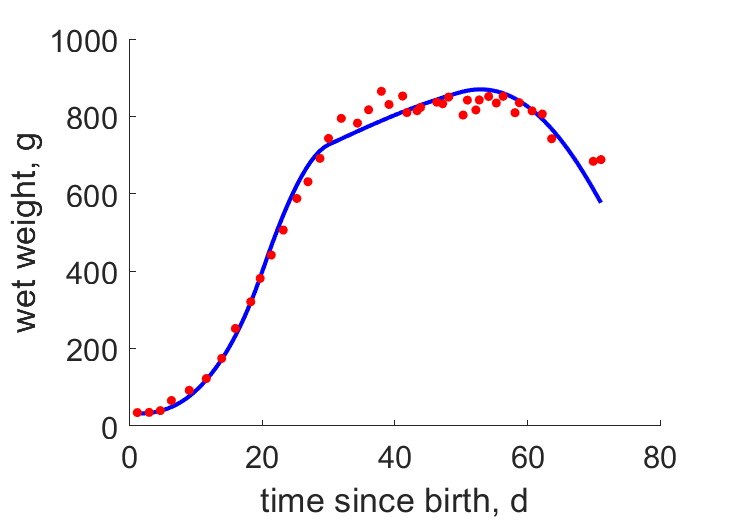Predictions & Data for this entry
| Model: std | climate: A | migrate: | phylum: |
| COMPLETE = 2.5 | ecozone: TPi | food: biHs | class: |
| MRE = 0.034 | habitat: 0iTi | gender: Dg | order: |
| SMSE = 0.002 | embryo: Tnwf | reprod: O | family: |
Zero-variate data
| Data | Observed | Predicted | (RE) | Unit | Description | Reference |
|---|---|---|---|---|---|---|
| ab | 29 | 31.8 | (0.09669) | d | age at birth | Kemp1995 |
| tx | 70 | 69.69 | (0.004469) | d | time since birth at fledging | guess |
| tp | 210 | 198.9 | (0.05275) | d | time since birth at puberty | guess |
| tR | 1095 | 1095 | ( 0) | d | time since birth at 1st brood | guess |
| am | 1.825e+04 | 1.818e+04 | (0.004083) | d | life span | guess |
| Wwb | 35 | 33.22 | (0.05092) | g | wet weight at birth | Kemp1995 |
| Wwi | 1081 | 1122 | (0.0377) | g | ultimate wet weight | avibase |
| Ri | 0.003288 | 0.003226 | (0.01863) | #/d | maximum reprod rate | avibase |
Uni- and bivariate data
| Data | Figure | Independent variable | Dependent variable | (RE) | Reference |
|---|---|---|---|---|---|
| tW |  | time since birth | wet weight | (0.03975) | WitmLaGr2020 |
Pseudo-data at Tref = 20°C
| Data | Generalised animal | Rhabdotorrhinus waldeni | Unit | Description |
|---|---|---|---|---|
| v | 0.02 | 0.03471 | cm/d | energy conductance |
| p_M | 18 | 275.9 | J/d.cm^3 | vol-spec som maint |
| k_J | 0.002 | 0.01141 | 1/d | maturity maint rate coefficient |
| k | 0.3 | 0.3029 | - | maintenance ratio |
| kap | 0.8 | 0.9801 | - | allocation fraction to soma |
| kap_G | 0.8 | 0.7998 | - | growth efficiency |
| kap_R | 0.95 | 0.95 | - | reproduction efficiency |
Discussion
- scaled functional response turned out to vary, which has been implemented
- mod_1: v reduced
- mod_1: Pseudo-data point k is used, rather than k_J; Data set tp and parameter t_R are added, the latter replacing clutch interval t_N. Postnatal T is based on PrinPres1991, see get_T_Aves. See further the revision page, theme puberty
Bibliography